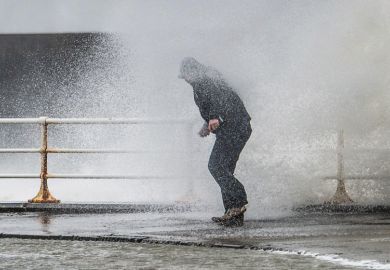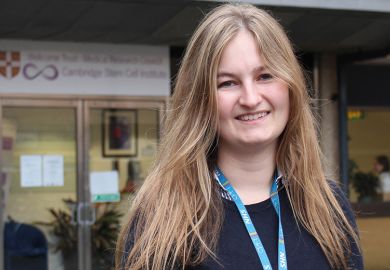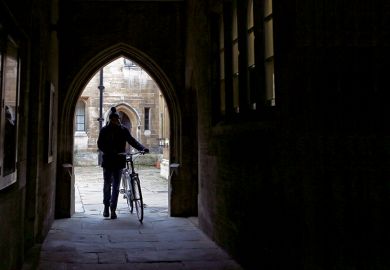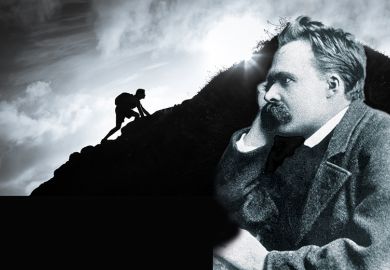The first time Janet Todd was diagnosed with cancer, in 2008, she had just taken over as president of Lucy Cavendish College, Cambridge. Someone she told about it, she recalled, “was clearly appalled, so I kept that one to myself”. Thinking that she could keep the symptoms under control, Professor Todd ended up having to call an ambulance twice within her first few weeks in the job. But although she “lived in a college house and the ambulance came with its loud siren”, the subject simply went unmentioned.
When her cancer recurred in 2011, Professor Todd was more open and received some sympathy and nice emails. Yet she also had “a brief panicky sense that this was the end” and found comfort in keeping a diary where she could reflect on her fears and the harrowing details of her treatment. The advantage of this, she wrote, was that it should “prevent excessive talking of symptoms. As the president of a Cambridge college, I might embarrass colleagues who’d be too polite to protest.” The disadvantage was that it was bound to be “indecorous and excremental”.
This indeed proved to be true. It contained a good deal about incontinence, disgust at her “scrawny, flabby torso – maybe, like wood, it would be improved by arty distressing” and impatience at hearing about other people’s medical problems. (“If it doesn’t involve imminent death, I really can’t be doing with it.”) Yet it also looked back both to her childhood and to an academic career that included almost two decades in the US as well as posts in Ghana, Puerto Rico and India. One memorable moment described her “heady…first brush with feminism American-style…Excited colourful women sitting in Florida in balmy weather acquainting ourselves – not an ounce of self-mockery – with the vulva and its secret folds.”
Although she kept the diary for herself and “would never have published while still head of college”, Professor Todd has now decided to release it as Radiation Diaries: Cancer, Memory and Fragments of a Life in Words (Fentum Press), partly to help inform both patients and doctors – although the postscript admits to “some embarrassment at not being dead”.
After working in Ghana, where the educational system still seemed very British, she told Times Higher Education, the US in 1964 was “the first country which felt quite alien from anywhere I’d been before”. Although she was promoted quickly, she “never got the tone right”, yet “the one thing I could relate to was the treatment of women. The feminism which got to me was the academic feminism which grew out of civil rights. In America, it was allowable to be feminist and middle class or academic in a way I don’t recollect in England in those early years.”
It was at this stage, too, that Professor Todd became “excited about a whole new area” of research and was “keen to excavate early women writers before it was at all fashionable”. Much of her subsequent scholarly work has been biographies, scholarly editions and critical studies of writers such as Jane Austen, Aphra Behn and Mary Wollstonecraft.
By the time she returned to England in 1983, Professor Todd had been “very influenced by that sort of [American] therapy culture, where everybody analysed themselves and talked about their feelings” – and again felt out of place. Furthermore, the academy, or at least Cambridge, “had hardly changed at all, it was pretty much teaching what they taught when I went there in 1961. I went to what was essentially a men’s college which had just admitted women. All the traditions were the same. The people who had resigned because they didn’t want women there at all had come back and were eating there.” The battle to give due recognition to “the huge sisterhood” of writers beyond Austen also “didn’t take off in England till rather later than in America”.
It is safe to say that few heads of Cambridge colleges have ever presented themselves to the world in the way that Professor Todd does in Radiation Diaries, which was due to be launched in the city on 20 June. So does she think that the academy is too squeamish in dealing with topics such as illness and old age?
“It’s a sort of public platform, the academy,” she replied, “and you are dealing with very young people, many of whom do not think they will ever be old or ill. I do think it would be good if the young were confronted with such things…I shudder a bit at the idea of safe spaces and that students should not hear what they don’t want to.”
POSTSCRIPT:
Print headline: ‘I feel a bit red-faced about not being dead’
Register to continue
Why register?
- Registration is free and only takes a moment
- Once registered, you can read 3 articles a month
- Sign up for our newsletter
Subscribe
Or subscribe for unlimited access to:
- Unlimited access to news, views, insights & reviews
- Digital editions
- Digital access to THE’s university and college rankings analysis
Already registered or a current subscriber?








